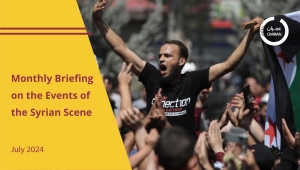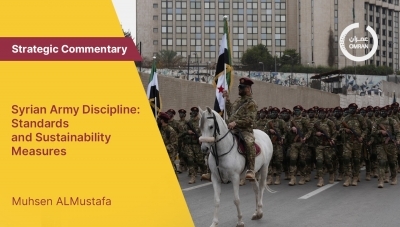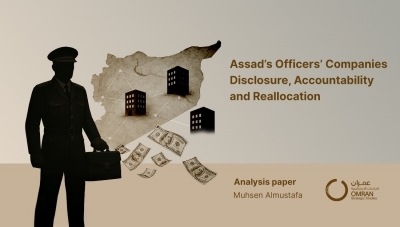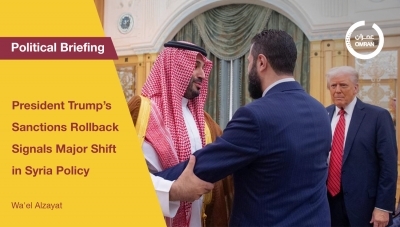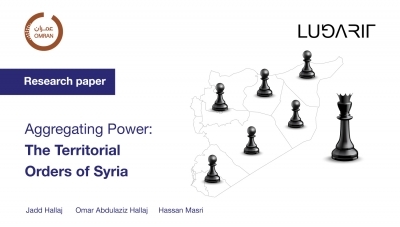Omran News
Monthly Briefing on the Events of the Syrian Scene - July 2024
General Summary
This report provides an overview of the key political, security, and economic events in Syria during the month of July 2024, examining developments across various levels.
- Politically, the normalization process with the Assad regime advanced with Italy appointing an ambassador to Damascus. Additionally, seven countries submitted a "non-paper" to the European Union, urging it to abandon the Three No’s policy. The regime also expressed its readiness to establish a new relationship with Turkey.
- Security, instability continues to rise across Syria. In the northwest, protests escalated into violence and direct confrontations with Turkish forces, while the region witnessed the largest drone attack by regime forces against civilian targets in rural Aleppo and Idlib in 2024. In eastern Syria, the international coalition is strengthening its positions as Iran-backed militias increase their attacks.
- Economically, exports through the Nasib border crossing continued to decline, and the regime's economic policies have led to increased capital flight and a higher cost of living. The Autonomous Administration in northeastern Syria (AANES) implemented economic policies that negatively impacted the agricultural sector.
Impact of Regional and International Normalization on Local Actors
Amid the ongoing normalization and restoration of relations with Bashar al-Assad, Italy announced the return of its diplomatic mission and the appointment of an ambassador in Damascus. This move coincided with efforts by Italy and six other EU member states to abandon the Three No’s policy that shapes the EU's stance on the Syrian issue. Meanwhile, the Syrian Regime’s Foreign Ministry issued a statement welcoming Turkey's calls to restore relations with Damascus, expressing readiness to establish a new relationship with Turkey based on clear principles, including the withdrawal of illegally stationed forces from Syrian territory and the combating of "terrorist groups" that threaten the security of both countries and linking the normalization of relations between the two countries to a return to the pre-2011 status quo.
The statement shows the regime's willingness to begin the normalization process and respond to Turkey's calls, dropping the precondition of Turkish troop withdrawal before the Erdogan-Assad meeting.
The regional and international normalization process with the Assad regime is progressing steadily, despite the differing motivations of the involved countries. These motivations are primarily security-driven or involve experimenting with alternative solutions under the guise of offering incentives to the regime, based on a step-by-step approach to gradually change its behavior. However, the normalization process is unfolding in a way that favors the regime and serves its interests. Bilateral agreements provide the regime with more maneuvering space, as they are tailored to each country's individual interests. Additionally, these agreements help the regime evade political obligations and the implementation of international resolutions, particularly Resolution 2245.
Domestically, the Assad regime held legislative elections for the fourth term since the adoption of the new constitution in 2012, following years of stagnation in the Syrian scene since the cessation of military operations under the de-escalation agreements. These elections come shortly after the Baath Party elections, which showed Assad's efforts to re-engineer power centers within the party and strengthen his absolute control to make it a disciplined political force aligned with Assad's direction and capable of interaction and leadership in any new political landscape. The regime's insistence on holding the elections aims to project an image of resilience and victory despite the conspiracies and international pressures, while also evading political solutions by claiming to strengthen its popular legitimacy through elections. Western countries considered the environment unsuitable for elections, while official opposition bodies called for genuine democratic elections in accordance with international resolutions, representing all segments of the Syrian people, unlike the current parliament. Additionally, popular and media campaigns opposed these superficial elections.
In northeastern Syria, the atmosphere of rapprochement between Turkey and the Assad regime has raised concerns among the AANES, considering it an existential threat and describing the process as a large conspiracy against the Syrian people. The administration realizes that Turkey's policy shift is strategic, not tactical, and that this rapprochement will reduce its available options and present it with difficult challenges, especially as it – if successful – would close the door to any future agreement between the administration and the regime. This explains the statement by Mazloum Abdi, the General Commander of the Syrian Democratic Forces (SDF), who affirmed that the Syrian crisis cannot be solved through violence and war, emphasizing the administration's readiness to engage in dialogue with all parties, including Turkey, to end the conflict and reach a political solution in Syria. To ease local tensions, the administration issued a general amnesty law in response to demands from the public, tribal leaders, and dignitaries. The amnesty includes hundreds of prisoners who committed crimes of terrorism and other offenses before the law was issued.
Rising Security Tensions: Popular Protests Increase Instability Indicators
In northwestern Syria, protests involved acts of vandalism against public and private property, including the burning of trucks, the removal of Turkish flags, and direct clashes with Turkish forces at several locations. This followed the acts of vandalism and attacks on Syrian refugees that occurred in Kayseri Province, Turkey, and in opposition to renewed talk of political normalization between Turkey and the Assad regime after Turkish officials' statements on rapprochement, which triggered the protests. Additionally, other factors led residents of these areas to express high levels of anger and frustration due to ongoing neglect of good governance issues, widespread corruption, security instability, and imbalanced civil-security relations, along with the lack of clear boundaries for the nature of relations with Turkey. Meanwhile, the Idlib region saw an escalation in military operations between regime forces and Hay'at Tahrir al-Sham (HTS), with the regime launching the largest drone attack of 2024 on civilian sites in rural Aleppo and Idlib. HTS continued to carry out infiltration operations against regime forces, the most notable being operations along the Saraqib axis at the beginning of July.
In other areas, the reconciliation model remains characterized by security fragility across different regions. In the town of Kanaker, after the regime imposed a new security reconciliation aimed at enlisting draft dodgers into the army, opponents of the reconciliation attacked a regime headquarters. This reconciliation and the accompanying events come weeks after clashes between regime forces and local militants at the start of the previous month. In Suwayda, the leader of the Mountain Brigade, Marheg al-Jurmani, known for his support of the popular movement in the province and his responsibility for protecting demonstrations there, was assassinated. This assassination is the most significant incident in the province since the start of the popular movement, occurring shortly after the regime brought in security reinforcements to the province. In Daraa, clashes continued between two local groups in the city of Jasim in rural Daraa for over ten days following the assassination of a leader from one of the groups and accusations that the other was behind the attack. In the same province, fighters launched multiple attacks targeting various regime sites in the province, coinciding with roadblocks using burning tires, in response to the kidnapping of a family from the Al-Sanamayn area by a gang affiliated with the 4th Division in rural Homs. The attacks ceased after the family was released.
Meanwhile, 60 people, most of them civilians, were killed in areas controlled by the AANES due to security disturbances, killings, and tribal conflicts, according to the Syrian Observatory for Human Rights. Additionally, ISIS operations continued in areas under the AANES influence, with 21 different security incidents involving shootings, killings with sharp objects, and planting explosive devices and landmines, resulting in six deaths. Meanwhile, the American base in the Koniko gas plant in rural Deir Ezzor was hit by rockets fired by Iranian backed-militias. American planes responded by targeting the surroundings of the seven villages in areas under the control of pro-Iranian militias in rural Deir Ezzor with heavy machine guns. New military reinforcements arrived for coalition forces in the area, including a short-range air defense system called Avenger. The international coalition has also begun constructing observation towers along the Euphrates River in eastern rural Deir Ezzor to monitor the area and control the security situation amid an increase in tribal attacks from the opposite bank on SDF positions and concerns of an Iranian escalation against the U.S. presence in the region.
Syrian Economy in a Vortex of Crises: Declining Exports and Increasing Living Costs
Syrian exports of vegetables and fruits to Jordan through the Nasib border crossing continued to decline significantly during July 2024 due to Jordan's restrictions on truck entry, following repeated incidents where the regime used trucks to smuggle drugs. This forced Jordan to upgrade the border infrastructure, modernize its equipment, and impose strict conditions on trucks coming from Syria. These measures result in significant losses for Syrian farmers and traders due to the spoilage of goods during the long wait at the border. These actions also negatively affect Syrian exports abroad, impacting foreign currency earnings and potentially straining relations with Jordan if drug smuggling into its territory and through it to the Gulf countries continues.
Regarding the ongoing economic stagnation in Syria and the regime's continued inability to develop the investment environment, figures indicate a 44% decrease in the number of registered companies in Syria during the first quarter of this year compared to the same period last year, along with continued capital flight due to worsening economic challenges. The number of registered traders in the Damascus Chamber of Commerce also dropped from 9,890 to 8,200 traders within one year, down from 17,000 traders before mandatory registration in social security. This decline is attributed to the rising costs of business, particularly energy costs and imposed taxes, difficulties in securing essential business supplies due to their high prices, declining competitiveness of Syrian products, and the lack of incentives and facilities offered by the government. These factors have driven many businesses to relocate to other countries.
Regarding the cost of living in regime-controlled areas, the cost of living for a family of five exceeded 13 million SYP in early July, according to the Qasioun Newspaper Index, while the minimum cost of living reached about 8.1 million SYP. Meanwhile, the minimum monthly wage was only about 278,000 SYP, which covers just 2.2% of the average cost of living in the first three months of 2024 and 2.1% in the following three months. This gap between low wages and high living costs exacerbates poverty and increases the number of people in need, further weakening the purchasing power of citizens, deepening the economic recession, and potentially leading to psychological effects on Syrian families, increasing social tensions, and worsening the humanitarian crisis.In the context of shortages of essential services such as gas and electricity, the waiting time for receiving a gas cylinder reached 85 days in Damascus and 100 days in Homs. This has led to a rise in prices on the black market, ranging from 250,000 to 300,000 SYP, adding to the living burden on residents, reducing their ability to meet basic needs, and increasing public dissatisfaction with government policies. Additionally, the growing reliance on the black market to obtain gas and other services contributes to further economic deterioration.
Regarding economic agreements with the regime's allies, the Syrian Battery and Liquid Gas Company in Aleppo signed a partnership memorandum of understanding with the Russian company Bogra Construction, committing the Russian company to supply, install, and equip a complete factory for the company. Despite a previously signed contract between the Syrian company and the Iranian company Tavan worth $41 million, the lack of progress under the contract indicates the fragility of Iranian investments in Syria and the competition from Russian investors in sectors entered by Iran. Reflecting the improvement in relations with Arab countries, the first Syrian Airlines flight arrived in Saudi Arabia after a year of the kingdom's approval to resume flights between the two countries. This move could open more avenues for cooperation between the two countries, positively impacting the regime's financial resources and encouraging other countries to resume air travel with Syria.
In northeastern Syria, the AANES decided to deprive summer vegetable farmers of their diesel fuel allocations, forcing farmers to buy it on the black market at high prices, which increased production costs and led to a 30% rise in local vegetable prices compared to previous years. These decisions are likely to reduce farmers' profit margins and their ability to continue farming. The lack of support could drive them to rely on the black market and pass on the increased costs to the prices of vegetables and fruits, adding to the financial burden on consumers and increasing poverty and deprivation among the population. This decision highlights the confusion in the administration's economic policies regarding planning and support for the agricultural sector, despite their adoption of socialist visions for regional management. In the same context, the quantity of wheat received this season in AANES areas has halved compared to the previous year due to the low purchase price set and farmers' reluctance to deliver their crops. The administration received only 766,000 tons of wheat, while expectations were around 1.5 million tons. The challenges facing farmers in Al-Hasakah have increased due to the lack of support and low local prices compared to the costs borne by farmers, forcing them to buy medicines and fertilizers in dollars on the black market, increasing costs and leading to a loss in the summer season. The decline in wheat received directly affects food security in the region. Farmers' reluctance to deliver their crops results in a growing trust gap between farmers and the "Autonomous Administration," reflecting the inefficiency of the administration's agricultural policies and its inability to meet farmers' needs.
In northern and eastern rural Aleppo, Syrian trucks resumed operations, transporting goods from border crossings with Turkey to northern Syria after a nearly complete halt lasting four years. Turkish trucks had stopped entering northern Syria due to the anger and protests in Syrian cities following the violence against Syrian refugees in Kayseri Province. The resumption of this activity is expected to create job opportunities for more than 700 Syrian truck drivers and around 500 workers in the region, helping to stimulate the local economy, reduce unemployment, and improve living conditions.

